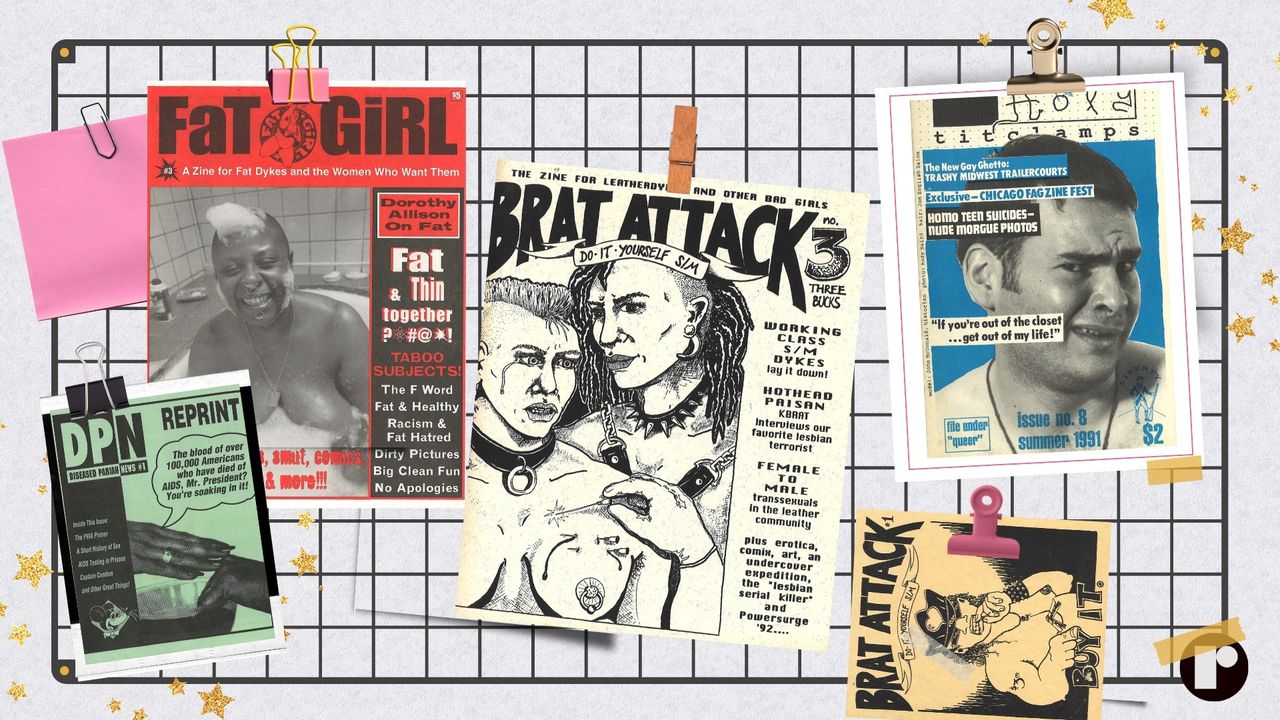From the Queer Archives: Uncovering the impact and legacy of LGBTQ zines
Since 2009, July has served as International Zine Month, a welcome excuse to celebrate queer underground and independent publishing each summer. Not sure what a zine (pronounced zeen) is? Most commonly made on photocopiers, with handwritten or typewritten text, drawings, and collaged images zines. Take a moment to learn about the format.
There are many ways to celebrate the month, like making zines, reading zines, buying zines, and sharing zines from favorite artists. In this month’s From the Queer Archives post, I’m celebrating International Zine Month by highlighting LGBTQ zines from the 1990s held in queer archives.
Holy Titclamps (1989-2003)
First published out of Minneapolis, MN, Holy Titclamps lasted for over a decade as a zine that documented the queercore scene from Minneapolis and eventually San Francisco. The 19 issues of Holy Titclamps featured cartoons, zine reviews, letters to the editors, poetry, art, fiction, comics, interviews and more for gay punks and rockers.
DPN: Diseased Pariah News (1990-1999)
Published amidst the AIDS Epidemic, Diseased Pariah News is full of dark humor, satire, and factual information for those living with HIV. DPN regularly featured comics, memorials, essays, letters to the “Deaditors,” and health and medical information. In an age of mass-misinformation of HIV/AIDS as the “gay disease” and a lack of critical governmental response, DPN, was a vehicle for positive gay men to laugh, rage, and share resources. All 11 issues of the Diseased Pariah News issues are digitized to read online.
Brat Attack: The Zine for Leatherdykes and Other Bad Girrrlz (1991-1994)
Although only five issues were ever published, Brat Attack regularly featured erotica, classified ads, comics, S/M guides and resources, and letters to the editor. It served as a space for younger leatherdykes interested in the punk scene to find each other and carve a more radical sexual space away from the mainstream leather scene.
FaT GiRL: A Zine for Fat Dykes and the Women Who Want Them (1994-1997)
FaT GiRL ran for seven issues, each 64-72 pages with a purpose of celebrating and building space for fat queer women to have a voice and be seen. Run by a collective and archived by the collective FaT GiRL can be viewed online.
Although not all zines are a collaborative effort, each of these zines showcase a different interest community within the LGBTQ community and document how people found each other to celebrate those niches. Zines are just one example of independent publishing throughout queer and trans history. LGBTQ folks have long been using equipment at work, public libraries, and in their homes to be able to make underground publications – newspapers, newsletters, magazines, pamphlets, etc. Independent publications have truly afforded LGBTQ people a place to write, build community, share ideas and art, all without being deemed as obscene or inappropriate. Want to learn more about historical queer zines? Check out the Queer Zine Archive Project based in Milwaukee, WI.
From the Queer Archives is a monthly post dedicated to LGBTQ history by culling queer and trans history from archival materials across the United States. Reckon focuses especially in the Midwest, a region where the experiences, contributions, and struggles of queer people and communities have been overlooked in historical narratives.
This series is critical in our current political and cultural moment where LGBTQ history, books, and representation are being removed from schools and public libraries. It is through historical visibility that LGBTQ people can understand this moment and themselves as part of a long legacy of queer and trans community-building.
Aiden M. Bettine is a trans archivist and historian. He is the Curator of the Tretter Collection in GLBT Studies at the University of Minnesota Libraries, the co-founder of Late Night Copies Press, a Minneapolis-based micropress that prints on photocopiers, and founder of the LGBTQ Iowa Archives & Library, a volunteer-led community archives & lending library in Iowa City. He specializes in researching and writing about queer and trans history throughout the Midwest.
